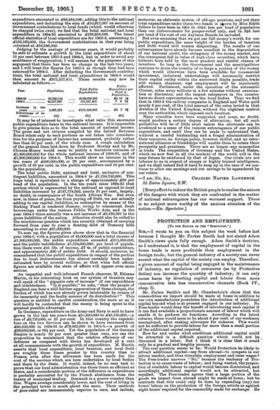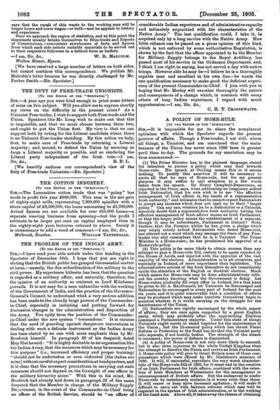wrote to you on this subject the week before last
because I thought Mr. Parker Smith had not stated Adam Smith's views quite fully enough. Adam Smith's doctrine, as I understand it, is that the employment of capital in the home trade is more profitable than employment in the foreign trade ; but the general industry of a society can never exceed what the capital of the society can employ. Therefore, a given amount of capital being engaged in the maintenance of industry, no regulation of commerce (as by Protective duties) can increase the quantity of industry; it can only cause harm by diverting capital and labour from more remunerative into less remunerative channels (Book IV., chap. 2).
Mr. Parker Smith's and Mr. Chamberlain's claim that the commodities we import should be made at home in addition to our own manufactures postulates the introduction of additional capital beyond what is at present engaged in our industry. No Free-trader would deny the benefit of introducing such capital if it can find available a proportionate amount of labour which will enable it to perform its functions. According to the latest returns, there would seem to be about 3 per cent. of our workmen unemployed, after making allowance for sickness. This would not be sufficient to provide labour for more than a small portion of the additional capital required.
How far and under what conditions additional capital could be attracted is a difficult question which could not be discussed in a letter. But I think it is clear that it could only be a gradual and lengthy process.
The real question seems to be : Would Protection be likely to attract additional capital—say from abroad—to compete in our labour market, and thus stimulate employment and raise wages ? The Free-trader answers " No," because the tendency of Pro- tection is to cause waste of labour ; and being wasted, the propor- tion of available labour to capital would become diminished, and accordingly additional capital would not be attracted, but repelled. The Free-trader agrees that a large portion of the goods we import from abroad might be made at home ; but he contends that this could only be done by expending (say) ten hours' labour on the production of the foreign article as against eight hours' required for the commodity made for exchange. He
Here we approach the region of statistics, and at this point the disputants usually betake themselves to Blue-books and Reports of Commissions,—convenient storehouses of facts and figures from which each side selects suitable materials to be served out to their respective followers in a tabloid form as leaflets.
[We have received a large number of letters on both sides, but cannot continue this correspondence. We publish Mr.
Malcolm's letter because he was directly challenged by Mr. Parker Smith.—En. Spectator.]







































 Previous page
Previous page